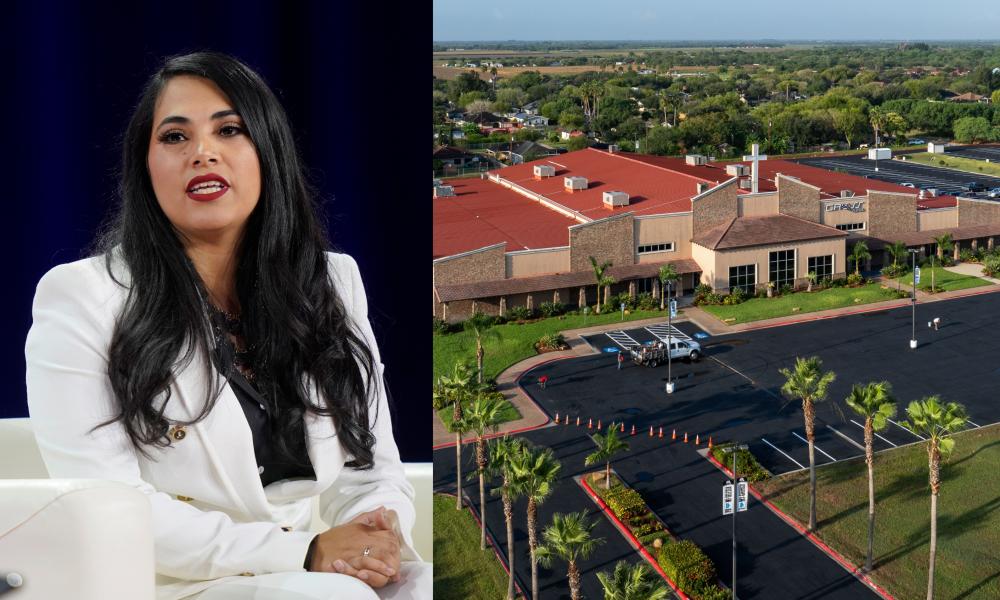In Texas’s 34th congressional district, Republican candidate Mayra Flores has faced scrutiny for her campaign activities that may contravene federal laws regarding political activities within tax-exempt religious organizations. Flores, a prominent candidate endorsed by former President Donald Trump, is vying to unseat incumbent Democratic representative Vicente Gonzalez. As part of her campaign, she has participated in various church events, which ostensibly have the character of community gatherings but also serve as rallies for her candidacy. However, federal regulations prohibit religious organizations from engaging in “political campaign intervention,” a stipulation tied to their tax-exempt status. Violations can occur if a church is perceived to favor or endorse a candidate or to create a partisan environment, placing Flores’s recent campaign activities under scrutiny.
Flores’s appearances at events organized within churches are notable, particularly because they feature significant campaign branding, including banners displaying her name alongside slogans such as “God Family Country.” In August, she attended a prayer event at Collective Church RGV, where large campaign banners were posted, and church leaders publicly prayed for her. The church shared social media posts celebrating her presence and calling for voter support. These actions raise potential legal concerns as they suggest an endorsement of Flores, which could jeopardize their tax-exempt status if not conducted in a non-partisan manner. Academic authorities, like tax expert John Darcy, emphasize the legal requirements that non-profit organizations maintain neutrality, asserting that engaging in promotional activities for a single candidate violates the tax code.
Beyond Collective Church RGV, Flores further engaged with religious organizations at multiple events, such as a “Revival on the Border” held in conjunction with the 501(c)(3) organization Bienvenido. This event, which was intertwined with conservative politics, included speeches from Flores and aligned with a broader pro-Trump message. Observers noted that these church gatherings often exhibit a clear political bias, particularly when candidates of opposing political views, such as Gonzalez, are not given similar platforms within those spaces. These patterns not only question the neutrality of the churches involved but reveal a disturbing trend of intertwining religion and politics, which has raised objections from both political opponents and constituents alike.
Flores’s campaign strategy appears to hinge on appealing to voters through religious sentiments, demonstrating how intertwined her candidacy is with Christian beliefs and values. At an event in San Benito, for instance, she emphasized the importance of electing candidates who share biblical values. This approach has drawn criticism, both from political adversaries and from constituents who are concerned about the implications of mixing church and state, as well as the broader ethical dilemmas of candidates using religion as a pillar of their campaign platforms. Opponents, including Gonzalez, have highlighted the necessity of maintaining a separation between religious gatherings and political endorsement, arguing that voters attend churches to engage in spiritual worship rather than political campaigning.
The defense from Flores’s camp suggests a level of political maneuvering that includes drawing parallels between her campaign activities and those of her opponent during his past electoral campaigns. However, Gonzalez has distanced himself from these church-based engagements, emphasizing that while he has participated in community gatherings, those events were distinctly separate from campaign activities. The motivation behind Flores’s actions raises questions about the intentions of political candidates who appeal to faith communities while potentially pressuring constituents to align their voting behavior with perceived moral or religious expectations.
The responses to Flores’s church-centered campaigning reflect a broader discontent among voters concerning the overlap of political messaging within religious spaces. Critics, including members of local congregations, have expressed unease regarding the appropriateness of politics in church settings. Concerns have been voiced about the ethical implications of prospective candidates exploiting the religious sentiment of congregants to leverage their campaigns, with some individuals expressing that it could compromise the sanctity of holy spaces. Such sentiments echo historical concerns about the erosion of the foundational principle of church-state separation—an issue that remains fraught in contemporary American politics.
In summary, Mayra Flores’s campaign strategies in Texas’s 34th district illuminate a complex intersection of religion and politics, raising significant legal and ethical questions. Her engagements at church events, characterized by overt political branding and messages, challenge the boundaries of tax-exempt status for these organizations while eliciting pushback from both political opponents and constituents wary of the implications of such an approach. As the campaign progresses, the tension surrounding the appropriate role of religious institutions in politics will remain a focal point, reflecting broader national conversations around governance, morality, and the core American values of church-state separation.

